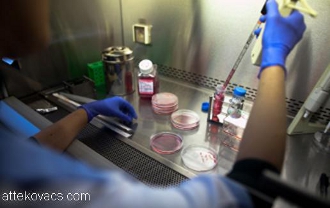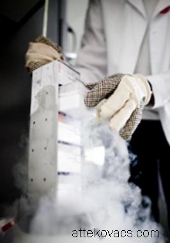Twenty-one research groups from ten universities have started their work through the support of the Hungarian Academy of Sciences. A total of HUF 600 million has been made available for the duration of the five-year grant period, which commenced on July 1, 2012. The largest portion of Academy-supported research groups are based at Semmelweis University and Eötvös Loránd University, boasting four groups each. Of the twenty-one groups, eight are involved in mathematics and the natural sciences, eight in the life sciences, and five in humanities and the social sciences. Four of the eight research groups working in the life sciences category are from Semmelweis University.
 The largest grant, namely HUF 43 million per year, was won by the research group led by Dr. László Hunyady, director of the Department of Physiology. Their research topic is the signalling and regulation of G protein-coupled receptors.
The largest grant, namely HUF 43 million per year, was won by the research group led by Dr. László Hunyady, director of the Department of Physiology. Their research topic is the signalling and regulation of G protein-coupled receptors.
Dr. György Kéri’s (Department of Medical Chemistry, Molecular Biology and Pathobiochemistry) research group received an annual grant of HUF 40 million for their topic: signal transduction therapy of cancer and metabolic syndrome diseases.
The research group led by Dr. Miklós Kellermayer, director of the Department of Biophysics and Radiation Biology, won a HUF 35 million per year grant, through which they plan to primarily conduct a biophysical examination of the interactions between protein membranes, as well as lipid and protein molecules. The measurements are performed on individual molecules and living cells. The Academy grant will be used to pay the salaries of nine researchers.
 An annual grant of HUF 30 million was awarded to the research group lead by Dr. József Tímár, director of the 2nd Department of Pathology, whose topic is the molecular characterisation of the spread of tumours. The research work will be conducted in collaboration with the 1st Department of Pathology and Experimental Cancer Research; the analysis of haematological tumours, leukaemia and lymphoma will be carried out in the 1st Department, while the 2nd Department will primarily focus on solid tumours (e.g. cancers of the kidney, lungs and breasts, melanoma). Molecular targets arising during the course of the research may become targets for new therapies.
An annual grant of HUF 30 million was awarded to the research group lead by Dr. József Tímár, director of the 2nd Department of Pathology, whose topic is the molecular characterisation of the spread of tumours. The research work will be conducted in collaboration with the 1st Department of Pathology and Experimental Cancer Research; the analysis of haematological tumours, leukaemia and lymphoma will be carried out in the 1st Department, while the 2nd Department will primarily focus on solid tumours (e.g. cancers of the kidney, lungs and breasts, melanoma). Molecular targets arising during the course of the research may become targets for new therapies.
Counting the new winners, a total of six Academy-supported research groups are currently working at Semmelweis University. Last year, the groups led by Dr. Tivadar Tulassay, director of the 1st Department of Paediatrics and Dr. Károly Rácz, director of the 2nd Department of Internal Medicine each received the five-year grant.
Pálma Dobozi / mta.hu
Translated by Gina Varga-Gönczi

